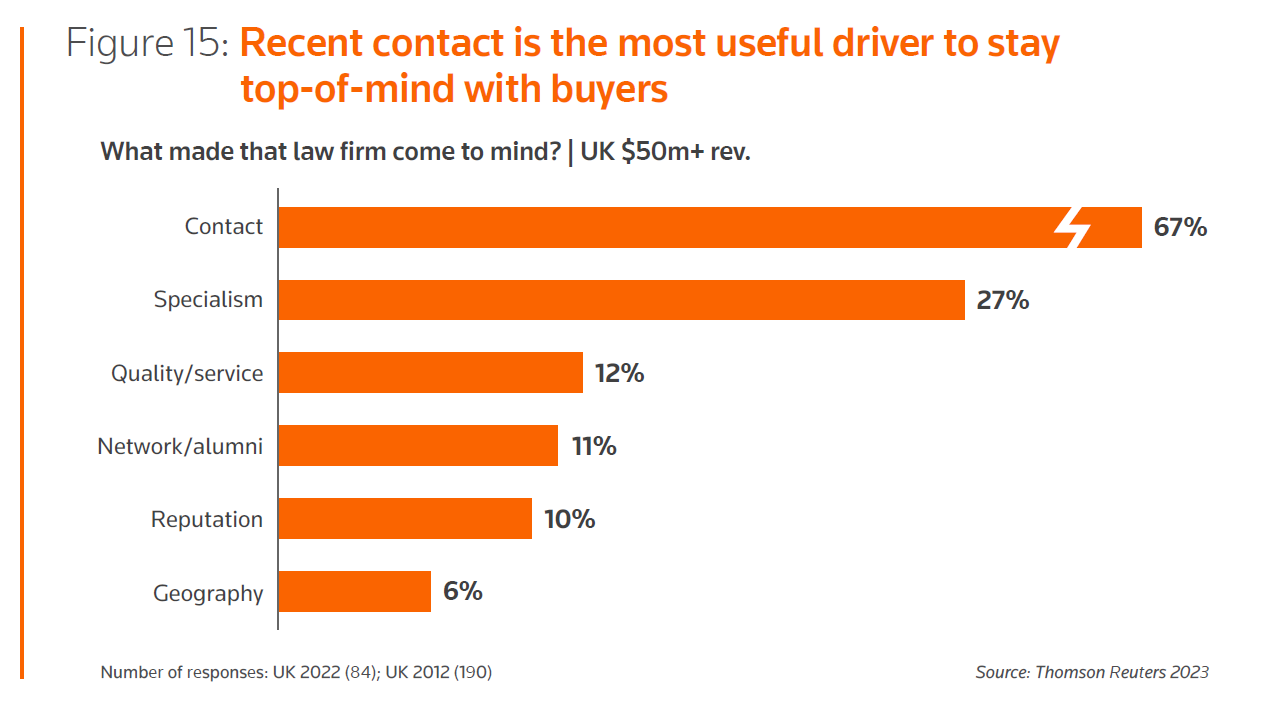The "2023 State of the UK Legal Market Report” shows that more personal contact with clients, rather than reputation alone, is making the difference
The cliché that holds “no one was ever fired for hiring (insert name of large U.K. law firm here)” may not ring as true today as it once did. Or at the very least, the large-scale brand reputation of a law firm may not weigh as heavily on a potential client’s decision to hire that firm, according to findings from the recent 2023 State of the U.K. Legal Market Report from the Thomson Reuters Institute.
According to the report: “Reputation as a driver of client awareness has dropped significantly compared with 10 years ago.” Looking back to 2012, almost one-quarter of buyers of legal services in the U.K. said that a firm’s reputation was one of the key things that made a particular law firm come to mind. Fast forward to the 2023 findings a decade later, and only 10% of respondents said the same.
There is no one clear explanation for this decrease. The prevailing theories to explain the decline include increased competition between law firms and among alternative legal service providers; enhancements in marketing efforts such as thought leadership by law firms to raise the profile of their expertise; and increased brand activity by the so-called Silver Circle law firms.
What is clear from the findings, however, is that personal contact and expertise are factoring much more heavily into clients’ buying decisions.

Two-thirds of respondents said that recent contact with their outside counsel firms, regardless of the presence of an ongoing legal matter, helped to differentiate which law firms stayed top-of-mind for clients. Slightly more than one-quarter of respondents pointed to demonstrated expertise as an additional driver that helped put firms in the forefront of clients’ consideration.
Why does this matter? Because securing client awareness and favorability is a key first step to winning business from the client and, hopefully, securing credibility in the client’s boardroom.
The difficulty of staying top of mind
As the report notes, there is an inherent pressure for lawyers in their efforts to develop new business. Such work is vital, but often comes into conflict with a lawyer’s need to bill hours. However, making the effort to stay in contact with a client even without a pending matter is critical because it can create opportunities for the client to better know the lawyer, and perhaps more importantly, for the lawyer to learn about the client and their business — a crucial factor to ensure that the attorney-client relationship does not become one which is overly transactional or commoditized.
The report argues: “Whilst much legal work can be commoditised, trust is not a commodity that can be easily replicated across different firms. In short, trusted partner status creates a competitive advantage for both an individual and a firm.”
Earning that trust, however, requires an investment of time and energy into maintaining open communication with the client. And, not incidentally, the trade-off sacrifice is potential billable hours.
The payoff, hopefully, is earning that coveted status of trusted advisor and a place at the front of the client’s mind when they have legal concerns.
Reputation still matters
None of this is to suggest that a firm’s reputation is no longer important. In fact, a firm’s reputation carries perhaps outsized weight when it comes to having credibility within a client’s boardroom. While only 10% of respondents said that a law firm’s reputation kept the law firm top of mind, close to 20% said that a firm’s reputation brings them credibility in the board room.
You can download a copy of the 2023 State of the U.K. Legal Market report, here.
In what is, perhaps, a telling comment, one survey respondent stated: “I’m not sure what they do differently, but they have a reputation in the market… board members will have heard of them or probably worked with them before.”
And therein lies the conundrum of a firm’s reputation. Unlike buying favorability, it doesn’t necessarily need to be built on differentiation. Instead, it’s the result of a long-time effort to stake out a place in the legal market firmament.
So, what is a firm to do if they do not enjoy such a reputation, but they want to win high-profile engagements from clients? They need to build the kind of reputation they would like to present to clients and the market.
Building a reputation
Reputation is earned over time. It is the result of long efforts resulting in quality results that meet a client’s goals. It is earned through continual demonstration of expertise, and it is a function of a strong relationship focused on becoming a trusted advisor. And it is dependent upon being keenly aware of the commercial needs of the client’s business.
In short, the process of building a reputation relies on many of the same things that make a firm top of mind, done repeatedly, with excellence.
These efforts will help keep the law firm top of mind, and in turn, will bring the firm consideration for other legal matters, which in turn leads to the firm winning the work. Delivering high-quality, commercially attuned advice time and again strengthens the relationship. All of which ultimately can craft a firm’s reputation for the better.







